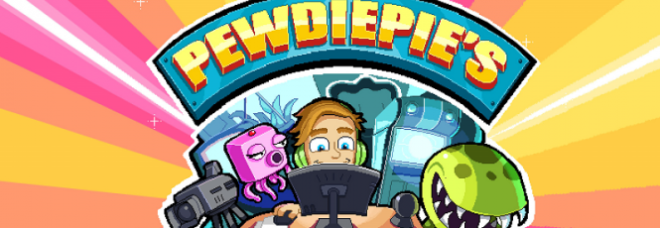Lately, I’ve been addicted to this app game called PewDiePie’s Tuber Simulator. As the name suggests, the app focuses on your rise to the top of YouTube, with the platform’s #1 subscribed personality- PewDiePie. It’s a pretty basic, tap-your-way-to-the-top, Kim Kardashian: Hollywood-like game. The main game play is you posting videos, and then waiting a few minutes in order to come back and reap the benefits. There’s also a room decorating aspect, where other players can vote for your room in a gigantic popularity contest.
It’s a very smart move- one that I’m shocked hadn’t happened before. It’s not like this is the first time a YouTube has milked every ounce of his/her personal brand to make money. Yes, every single one of those words is a link to a different book. Am I the only one that thinks memoir books written by 20-somethings sounds absolutely cringe-worthy?

Maybe I’m just being bitter about the fact that all of the “authors” linked above have had, and probably will have, more success then I’ll ever have. And money. Or maybe it’s me knowing that there’s at least one person pulling the strings behind each of these books, and each personality’s’ young impressionable fans are gobbling up these books like they’re authentically written by their internet idol. There’s hardly a chance any of these books are being purchased by someone over the age of 30.
But beyond the gaming and slightly un-ethical book selling, there’s one part to this that I’ve never fully understood: the affect on your personal brand.
I’ve always wondered how long-term celebrities think out this app thing. Odds are, you don’t want to become a Flappy Bird– a one-and-done app everyone downloads to say they’ve experienced it, and promptly delete it after a few plays. That’s not how you can make extreme amounts of revenue. To look at an ultimate example of how to 1) create an app focused around your personal brand, 2) let it bring you positive buzz, not controversy, and 3) profit, would be to take notes from Kim Kardashian: Hollywood.
The genius behind Kim K’s app is its ability to stay fresh. I’m always getting updates and notifications that there’s a new place to visit, new events to participate in, or new fashions to buy. In it’s current state, I don’t see how Tuber Simulator can expand on it’s current universe. It’s a YouTube game. You make videos to get famous and rich. Then what? Once you max out your level and trick out your room, what else is there to do? While the action’s not any different in Kim K since its launch, at least it tries to use the new additions to give the app a fresh feel.
Whereas Kim Kardashian: Hollywood keeps adding new places and events (last week, Halloween parties, a personal gym, and the ability to travel to Abu Dhabi were added), Kim Kardashian has you travelling all over the world to meet new creative minds and gain fame, Tuber Simulator has you trapped in your bedroom. It makes sense- as a gamer, the way you make your money and fame is streaming. In most real life cases, a YouTuber’s office is his/her bedroom. If you leave, you can’t make money. It’s not like the Kardashian app, where gameplay can consist of you being paid to make an appearance in Milan. While Tuber Simulator also had a Halloween update, I can see that this app’s hype will be short lived. The only things added for three weeks in October were ghost graphics on the start screen, about ten Halloween items to purchase, and a temporary Halloween ‘theme’ used in the very limited strategy aspect of the game. It’s still great that the developers are continuing to support the app after launch, I can’t say I’m impressed by their offerings. In the gaming age where DLC runs supreme, games must be created with after-launch support in mind. If you want to be able to continue to rake in ad revenue, you need to create a sustainable game. And if Tuber Simulator keeps up with the lackluster updates, I wouldn’t be shocked this game will sink into obscurity once the novelty wears off.
Which leads us back to the question I’ve been wondering as I’ve watched product after product branded by a YouTuber sink. Even the sacred book isn’t safe- YouTuber Zoella found herself in hot water after it was revealed she had a ghostwriter on her book, Girl Online. While authenticity may not be the problem at stake for Kim K or PewDiePie, as games aren’t expected to have one sole creator unlike books, there’s the issue of consumer opinion of these celebrities based on their app experiences. If developers of either app come out with an update that players hate, then that controversy will be aimed at the celebrities, not the developers. And as the popularity of each app wanes, will the brand image of each star wane as well? Are we going to see YouTuber apps flood the market like books did previously thanks to PewDiePie’s success?
These are the things I wonder about as I’m tapping my way to internet stardom. Books are one thing- you write it once, publish it, sit back, and rake in the money. Apps are another- you develop it, publish it, then continually update it to keep user interest. While I suppose apps are a more lucrative business, they may become like books are today for YouTubers- in order to be seen as a ‘legit’ star, you’ll need to have an app.

